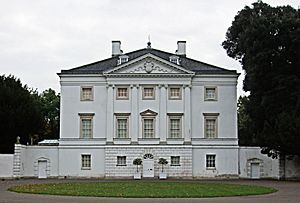Henrietta Howard, Countess of Suffolk facts for kids
Quick facts for kids Henrietta Howard |
|
|---|---|
| Henrietta Howard, Countess of Suffolk, c. 1724, by Charles Jervas. | |
|
|
|
| Spouse(s) | Charles Howard, 9th Earl of Suffolk George Berkeley |
| Issue | |
| Henry Howard, 10th Earl of Suffolk | |
| Noble family | Hobart |
| Father | Sir Henry Hobart, 4th Baronet |
| Mother | Elizabeth Maynard |
| Born | 1689 Norfolk |
| Died | 26 July 1767 Richmond upon Thames |
| Occupation | Lady of the Bedchamber to Caroline of Ansbach |
Henrietta Howard (born Henrietta Hobart; 1689–26 July 1767) was an important person in the British royal court. She is known for her close relationship with King George II of Great Britain. She was also the sister of John Hobart, 1st Earl of Buckinghamshire.
Contents
Early Life and Family
Henrietta Hobart was born in 1689. She was one of three daughters of Sir Henry Hobart, 4th Baronet. He was a landowner from Norfolk. Her mother was Elizabeth Maynard.
When Henrietta was eight, her father died in a duel. Four years later, in 1701, her mother also passed away. This left Henrietta an orphan at the age of twelve. She then became a ward of Henry Howard, 5th Earl of Suffolk.
Marriage and Challenges
Henrietta married Charles Howard, the youngest son of her guardian. The wedding took place in London on March 2, 1706. Charles later became the 9th Earl of Suffolk.
They had one son, who would become Henry Howard, 10th Earl of Suffolk. Henrietta's marriage was not a happy one. She also became deaf at a young age.
Life at Court
In 1714, Henrietta and her husband traveled to Hanover. They hoped to gain favor with the future King George I of Great Britain. There, Henrietta met his son, who would later become King George II.
She became a close companion to the future King George II. She was also appointed a Lady of the Bedchamber to his wife, Caroline of Ansbach. This meant she helped the Queen with her daily life.
Royal Connections
In 1723, the Prince of Wales (who became George II) made an agreement with Henrietta's husband. This was in exchange for Henrietta's services at court. Queen Caroline liked Henrietta. She was happy that the King had a companion she found pleasant.
Henrietta was known for being witty and intelligent. She and her husband officially separated around 1727. A formal divorce would have needed a special law from Parliament. This would have caused too much public attention.
In 1731, Charles became the Earl of Suffolk. This allowed Henrietta to be called Countess of Suffolk. After Charles Howard died in 1733, Henrietta married again in 1735. Her second husband was the Hon. George Berkeley.
Marble Hill House
After King George II found a new companion in 1734, Henrietta received a large amount of money from him. She used this to buy land near the River Thames.
Marble Hill House in Twickenham was built for her on this land. The architect was Roger Morris. He worked with Henry Herbert, 9th Earl of Pembroke on its design.
Later Years and Friends
When her second husband died in 1746, Henrietta moved permanently to Marble Hill House. She created a group of intellectual friends there. Many famous people were her friends. These included Charles Mordaunt, 3rd Earl of Peterborough, John Gay, and Alexander Pope.
She also exchanged letters with Horace Walpole and Jonathan Swift. Alexander Pope wrote about her in his poem "On a certain lady at court": I knew a thing that’s most uncommon (Envy be silent and attend!) I knew a reasonable woman, Handsome and witty, yet a friend.
Many believe she was the inspiration for Chloe in Pope's poem Epistle To a Lady. She is also a character in The Heart of Midlothian by Sir Walter Scott. Scott accurately described her complex friendship with Queen Caroline.
See also
- English royal mistress
| Court offices | ||
|---|---|---|
| Preceded by Elizabeth Sackville, Duchess of Dorset |
Mistress of the Robes to the Queen 1731–1735 |
Succeeded by Mary Bertie, Duchess of Ancaster and Kesteven |
 | William M. Jackson |
 | Juan E. Gilbert |
 | Neil deGrasse Tyson |


